Penguin News Articles
-
 by
caitlin.black
moderator, scientist, admin
by
caitlin.black
moderator, scientist, admin
Because we have been getting some great coverage on Penguin Watch, we thought this would be a great place to share articles about the site as well as news on penguins in general as it becomes relevant. Feel free to post what you find most interesting about penguins!
Washington Post: http://www.washingtonpost.com/news/speaking-of-science/wp/2014/09/19/spend-today-counting-penguins-for-science/
BBC Radio 4 Inside Science: http://www.bbc.co.uk/programmes/b04gwlln
The Times: http://www.thetimes.co.uk/tto/environment/wildlife/article4208921.ece
University of Oxford: http://www.ox.ac.uk/news/2014-09-17-spy-penguin-families-science
Discover Magazine: http://blogs.discovermagazine.com/inkfish/2014/09/18/too-many-penguins-is-the-best-kind-of-problem/#.VBwupC5dVql
ABC Australia: http://www.abc.net.au/news/2014-09-17/pennys2jpg/5751532
Posted
-
 by
caitlin.black
moderator, scientist, admin
by
caitlin.black
moderator, scientist, admin
The Nature Conservancy: http://blog.nature.org/science/2014/09/23/citizen-science-penguin-watch-nature-online-conservation-birds/
Posted
-
 by
caitlin.black
moderator, scientist, admin
by
caitlin.black
moderator, scientist, admin
Here's the latest video form BBC Breakfast:
http://www.bbc.co.uk/news/uk-29339583
Posted
-
 by
Tockolock
by
Tockolock
Would it be possible to give the approximate dates of when to look out for eggs, chicks, moulting chicks and moulting adults as most pictures have a Date and Time stamp and it would be helpfull for your participants.
Are you happy with just the Thirty classifications on each picture or would you like as many as possible, some of the pictures have 30+ in the foreground and many many more in the background which would be missed on the survey.Posted
-
 by
yshish
moderator, translator
by
yshish
moderator, translator
Hi @Tockolock
I'll try to look for some sources with answers for your questions.
Here is at least some more info about King penguins: http://www.coolantarctica.com/Antarctica fact file/wildlife/King_penguins.htm
As for the 'thirty' classifications: It would be great, if you could classify all the penguins you can. But at some images it would be too exhausting and boring so there is an option to stop after the first 30 and then it's up to you whether to stop or to continue.
Thanks for your hard work.
Z.
Posted
-
 by
BellisP
by
BellisP
Hello - the scientists have put some info for volunteers here
http://www.penguinwatch.org/#/sciencescroll right to the bottom and it shows approximate timings of nesting/egg hatch/moulting etc. Although it is only a rough guide as reading the comments on here from moderators seems like timings can be a month or two either side sometimes/at some sites.
Posted
-
 by
yshish
moderator, translator
by
yshish
moderator, translator
Travelwild Expeditions have some useful information about these species (physical characteristics included!)
Adélies https://travelwild.com/antarctica-wildlife/adelie-penguin/
Gentoos https://travelwild.com/antarctica-wildlife/gentoo-penguin/
Chinstraps https://travelwild.com/antarctica-wildlife/chinstrap-penguin/
King penguins https://travelwild.com/antarctica-wildlife/king-penguin/
Posted
-
 by
yshish
moderator, translator
by
yshish
moderator, translator
And here are diagrams of a breeding behavior for each species
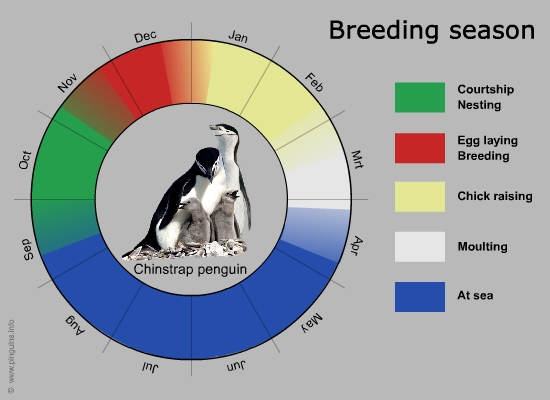
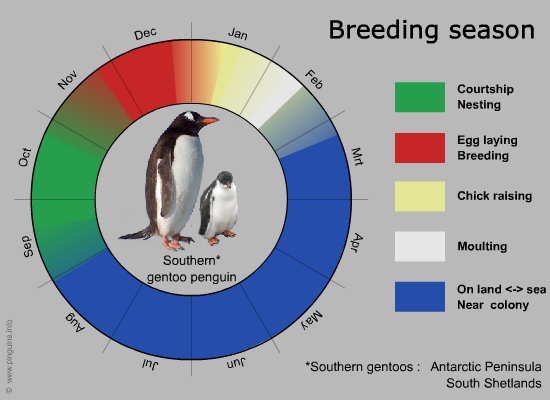
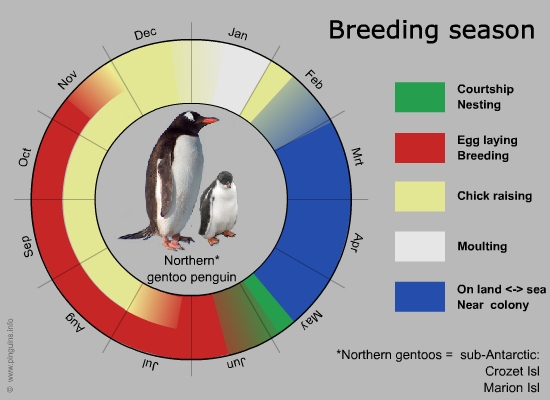
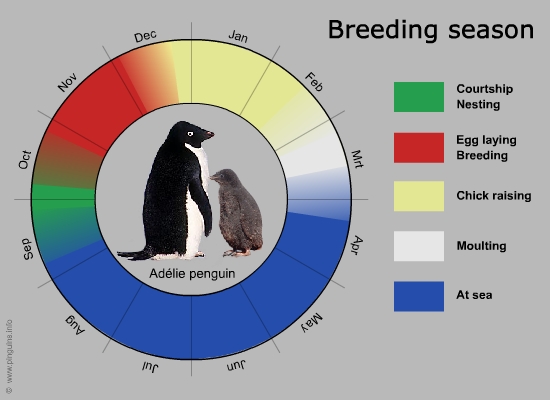
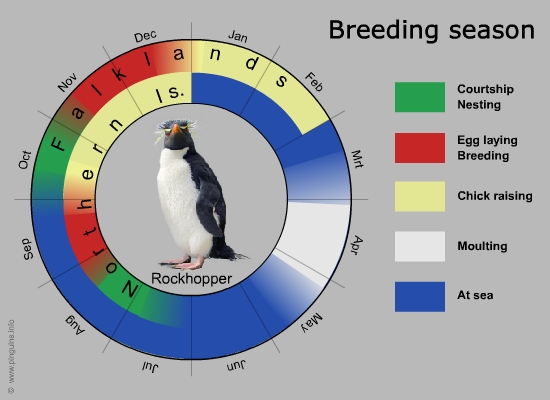
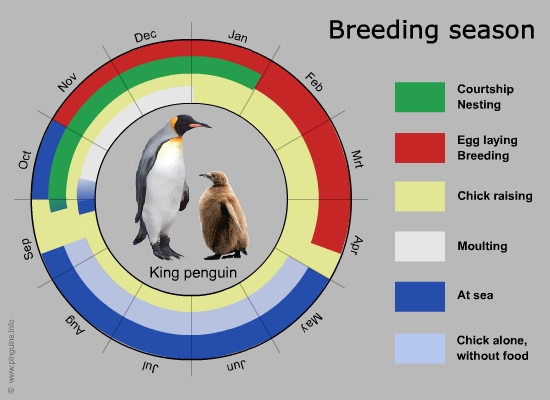
or another one for King penguins

Sources:
Pinguins.info - All about penguins (mating, nesting, breeding, species, etc.) in this page
Penguin Sentinels - University of Washington
Posted
-
 by
yshish
moderator, translator
by
yshish
moderator, translator
Since the page from my last post doesn't load all images of the breeding cycles properly, I created new ones* for you myself.
Adélie penguins:
](https://lh5.googleusercontent.com/-aHrUT_fhQ0A/VDgHkQcHmGI/AAAAAAAAHL8/deAJtWau9qM/s720/ysh_Adeliex.jpg)
Chinstrap penguins:

Southern gentoo penguins:

Northern gentoo penguins:

Rockhoppers

Hopefully it is correct.
(Edit: I added rockhoppers' cycle. Wait for the others..)
*Adapted from Pinguins info (2014) by Zuzi/Yshish /aproved by the PW science team.
Posted
-
COOL:]
Posted
-
 by
BellisP
by
BellisP
This is brilliant, and it must have been a lot of work. Thanks Yshish
Maybe it even deserves a new thread of it's own, might be the best way to make sure newbies find it too...
Posted
-
 by
Ips
by
Ips
Back "on topic":
There was also some converage in the German press, in this article in the Süddeutsche Zeitung (one of the bigger broadsheets with national circulation) on the 24th of September.
http://www.sueddeutsche.de/wissen/buergerwissenschaftler-pinguine-im-fadenkreuz-1.2144193Posted
-
 by
mhwombat
by
mhwombat
Cleverly Disguised Baby Penguin Robot Interacts With Emperor Penguin Colony
https://www.youtube.com/watch?v=p_1vVtYqWxwPosted
-
 by
yshish
moderator, translator
by
yshish
moderator, translator
Wow, a new blog post from the scientists with some really cool photos from the field!!! 😃
Life in the Field- Two Months in the Falkland Islands, South Georgia, and Antarctica
Posted
-
 by
DZM
admin
by
DZM
admin
Wonderful photos! Thank you for sharing!!
Posted
-
 by
yshish
moderator, translator
by
yshish
moderator, translator
Hi Penguin Watchers!
Here's a new blog post
From South Georgia to the Peninsula with greetings from Antarctica by Tom!Z.
Posted
-
 by
gardenmaeve
moderator
by
gardenmaeve
moderator
Interesting article:
http://www.bbc.com/news/science-environment-31490623Posted
-
 by
yshish
moderator, translator
in response to gardenmaeve's comment.
by
yshish
moderator, translator
in response to gardenmaeve's comment.
Thank you, @Gardenmaeve ,it's really interesting!
Posted
-
 by
elizabeth_s
by
elizabeth_s
off topic but this caught my eye. http://news.yahoo.com/antarctica-post-office-job-port-lockroy-application-190236612.html
Posted
-
 by
gardenmaeve
moderator
by
gardenmaeve
moderator
http://videowall.accuweather.com/detail/video/4072413525001
King penguins slidingPosted
-
 by
AvastMH
moderator
by
AvastMH
moderator
That was delightful gardenmaeve...such fun. They seemed to enjoy exercising in the snow as if swimming. And their colouring is so pretty 😄
Posted
-
 by
yshish
moderator, translator
by
yshish
moderator, translator
I'm so sorry I can't play any videos on this device.. my laptop hasn't been repaired yet 😦
Posted
-
 by
yshish
moderator, translator
by
yshish
moderator, translator
Tom Hart - The man who spies on penguins for science!
Posted
-
 by
AvastMH
moderator
by
AvastMH
moderator
What a wonderful article! Great to see Tom in action. And great to hear that our citizen science efforts are shedding light on the penguins' problematic situation. I notice the first picture is of the pair of cameras covering penguin ridge on Petermann Island, that red hut being so conspicuous in the background - I was SO excited to see that!!!!! I mean really really excited!
Posted
-
 by
gardenmaeve
moderator
by
gardenmaeve
moderator
I enjoyed reading the article. Thank you! As AvastMH noted- great to know we are making a difference for the project.
Posted
-
 by
yshish
moderator, translator
by
yshish
moderator, translator
Thank you for the participating! The project wouldn't be this successful without you, classifiers! 😉
Posted
-
 by
gardenmaeve
moderator
by
gardenmaeve
moderator
Thinking about penguin feathers, and the spinning into yarn of the down... some article links:
http://www.coolantarctica.com/Antarctica fact file/science/cold_penguins.htm
This shows some penguin feathers and discusses why even with cold feet penguins can move normally.http://www.sciencedirect.com/science/article/pii/S0142941809000622 thermal qualities of penguin down
http://www.jstor.org/discover/10.2307/4086975?sid=21105958019133&uid=2129&uid=3739256&uid=70&uid=3739712&uid=4&uid=2 more thorough discussion of the thermal characteristics of penguin down
https://books.google.com/books?id=l7E9SysL_OkC&pg=PA368&lpg=PA368&dq=penguin+feathers+for+spinning&source=bl&ots=XJeCyChpyh&sig=Md2rsOjQ_rsafeSoj5XUwq4UsnU&hl=en&sa=X&ei=sHfuVOPQBeHdsASBqoGwDQ&ved=0CCUQ6AEwAQ#v=onepage&q=penguin feathers for spinning&f=false From volume 10 of the "Foxfire" series of old-time skills.
Posted
-
 by
yshish
moderator, translator
in response to gardenmaeve's comment.
by
yshish
moderator, translator
in response to gardenmaeve's comment.
Really cool!! Thanks for all those links, @Gardenmaeve 😃 Wish you to be able to try that spinning from penguin feathers!
Maybe you could visit a Zoo nearby your place and ask for some feathers during the moulting season to give it a try and then let us know how was that going? 😉
Posted
-
 by
gardenmaeve
moderator
by
gardenmaeve
moderator
Good idea @yshish...no zoos anywhere near where we live. If I find a way to (responsibly and legally) get some down I'll be sure to let you know how well it spins.
Posted
-
 by
AvastMH
moderator
by
AvastMH
moderator
That sounds like fun! - and thanks for the links gardenmaeve. Let me know if you manage to get any of the feathers 😄
Posted
-
 by
gardenmaeve
moderator
by
gardenmaeve
moderator
Update on Penguin Post Office job openings: https://gma.yahoo.com/antarctica-penguin-post-office-job-attracts-record-number-194402318--abc-news-travel.html
Posted
-
 by
yshish
moderator, translator
in response to gardenmaeve's comment.
by
yshish
moderator, translator
in response to gardenmaeve's comment.
Hahaha, really cool!! Thanks for sharing 😃
Posted
-
 by
AvastMH
moderator
by
AvastMH
moderator
Amazing! I wonder who will be the lucky ones?? 😃
Posted
-
 by
yshish
moderator, translator
by
yshish
moderator, translator
Here is a link to the newest blog post by Tom, one of our scientists 😃
The Antarctic Peninsula in Glorious Sunshine.
Posted
-
 by
gardenmaeve
moderator
by
gardenmaeve
moderator
Information regarding Gentoo behavior and chick rearing: http://www.penguins.cl/gentoo-penguins.htm
More on Gentoo appearance: " The bill is black with sides orange in males and pinkish-orange in females, the feet are orange." http://www.waza.org/en/zoo/visit-the-zoo/penguins-and-other-seabirds-1256627554/pygoscelis-papua
Posted
-
 by
gardenmaeve
moderator
by
gardenmaeve
moderator
Informative blog article on Krill, from the Quork (where are the results of the contest please) Expeditions:
http://blog.quarkexpeditions.com/spotlight-on-krill-tiny-species-massive-importancePosted
-
 by
yshish
moderator, translator
by
yshish
moderator, translator
Hey!! 😄
Our latest (and first!) paper is out today from the camera network.
Discover why gentoo chicks huddle at http://journals.plos.org/plosone/article?id=10.1371%2Fjournal.pone.0145676
Abstract
Aggregations of young animals are common in a range of endothermic and ectothermic species, yet the adaptive behavior may depend on social circumstance and local conditions. In penguins, many species form aggregations (aka. crèches) for a variety of purposes, whilst others have never been observed exhibiting this behavior. Those that do form aggregations do so for three known benefits: 1) reduced thermoregulatory requirements, 2) avoidance of unrelated-adult aggression, and 3) lower predation risk. In gentoo penguins, Pygoscelis papua, chick aggregations are known to form during the post-guard period, yet the cause of these aggregations is poorly understood. Here, for the first time, we study aggregation behavior in gentoo penguins, examining four study sites along a latitudinal gradient using time-lapse cameras to examine the adaptive benefit of aggregations to chicks. Our results support the idea that aggregations of gentoo chicks decrease an individual’s energetic expenditure when wet, cold conditions are present. However, we found significant differences in aggregation behavior between the lowest latitude site, Maiviken, South Georgia, and two of the higher latitude sites on the Antarctic Peninsula, suggesting this behavior may be colony specific. We provide strong evidence that more chicks aggregate and a larger number of aggregations occur on South Georgia, while the opposite occurs at Petermann Island in Antarctica. Future studies should evaluate multiple seabird colonies within one species before generalizing behaviors based on one location, and past studies may need to be re-evaluated to determine whether chick aggregation and other behaviors are in fact exhibited species-wide.
Posted
-
 by
AvastMH
moderator
by
AvastMH
moderator
That's a very fascinating article. I do enjoy it when we get to see the in-depth science that our penguin counting produces. I know we have good fun as well as discussing real events. But we are here to produce those valuable details and it is so satisfying to see them. Citizen Science is wonderful 😃
Thank you Yshish! 😃Posted
-
 by
gardenmaeve
moderator
by
gardenmaeve
moderator
We've identified leucistic penguins on Penguin Watch. Here's an article about a form of leucism in Little Penguins, also known as Fairy penguins. We don't see this species on PW, but the implications are the same for those we do see. Piebald leucism "Piebald leucism differs from albinism in that the affected cells still have the ability to produce pigment but have that specific function turned off."
Posted
-
 by
gardenmaeve
moderator
by
gardenmaeve
moderator
Here's a new article about Adelie Penguins: Antarctica- Adelie penguin populations in decline here
"...The picture looks grim for some of the chubby birds: By 2060, about 30 percent of the colonies may have lower populations, while 60 percent of colonies will be in decline by the turn of this century, the researchers reported June 29 in the journal Scientific Reports. Overall, about half of the penguins could vanish by 2099..."Posted
-
 by
gardenmaeve
moderator
by
gardenmaeve
moderator
Lincoln Park Zoo, associated with Zooniverse project Chicago Wildlife Watch, has an interesting article concerning a trip to rehabilitate endangered African penguin chicks courtesy of a Feay Earthwatch grant. Well worth reading: Diving Right In March 16, 2016 by Lincoln Park Zoo in Conservation Field Diaries , and news of an upcoming zoo habitat for African penguins, opening this Autumn (2016) here: Robert and Mayari Pritzker Penguin Cove - scroll down to find the penguins and a short video as well.
Posted
-
 by
AvastMH
moderator
by
AvastMH
moderator
That's a great piece of news @gardenmaeve ! I seem to recall that one of our excellent volunteers worked for SANNCOB at some point 😄
Posted
-
 by
gardenmaeve
moderator
by
gardenmaeve
moderator
It's a wonderful and productive program, it seems.
Posted
-
 by
Gromito
by
Gromito
Happy National Penguin Day!
Posted
-
 by
AvastMH
moderator
by
AvastMH
moderator
Hi Gromito!
Thank you for posting your best wishes for World Penguin Day! 😄
Also a big thank you to all of our wonderful volunteers. I'll take this opportunity to write a few words about PW...
It's an odd thing to be sat at your computer, or perhaps clicking away at marking penguins on a tablet when you're on the bus or train. Perhaps sparing the very few minutes that you can afford in your day. Or using hours of spare time when the chance arises.
Perhaps you marked some penguins in a project at school today? Or perhaps you mark a few with the help of mum and dad at home?
As I write, that action of marking penguins puts you in touch with 45902 other volunteers. Nearly 46,000 people. You may never meet them, but you share the kindness of being a citizen scientist. No matter what your background, sparing time to mark these beautiful creatures as advanced science. That is so critical to preserving their numbers, indeed hopefully increasing them.
And look at the work you've all done. Each time a picture is sent off as 'finished' we notch that up as a classification, and the total of those is 5,663,084. Well over five-and-a-half-million pictures marked since September 2014. That's almost exactly 6000 per day.
So when you finish marking today, give yourself a pat on the back for being a penguinologist. You are a living part of real science! 😄
Here's a beautiful picture of Egg_Rock. It shows adults penguins, healthy chicks, and a shadow of the camera pole which represents you....

...enjoy it, enjoy your time on PW. Happy World Penguin Day, and 'thank you' for all your excellent work. Here's to a successful year of marking towards WPD 2018! 😄
( #socialmedia )
Posted
-
 by
yshish
moderator, translator
by
yshish
moderator, translator
Hey,
just for the case someone missed that, there was a brilliant LIVE interview with our Dr. Tom Hart and Fiona Jones from the PW research team recently.
You can watch it from the record here via Facebook:
https://www.facebook.com/OxSparks/videos/1306175842793373/
Cheers,
Zuzi
Posted
-
 by
Blodosaurus
by
Blodosaurus
I saw this great penguin news on the BBC ☺
Penguin super-colony spotted from space - http://www.bbc.co.uk/news/science-environment-43250744
Posted
-
 by
gardenmaeve
moderator
by
gardenmaeve
moderator
Thank you, @Blodosaurus. Yes- Penguin Watch's own penguinologist was involved with this expedition in 2015, and we are delighted to see the results published and publicized. 😃
Posted
-
 by
AvastMH
moderator
in response to Blodosaurus's comment.
by
AvastMH
moderator
in response to Blodosaurus's comment.
Hello @Blodosaurus ! Good to hear from you. Yes - it's such exciting news isn't it? I sometimes sit outside in my garden on a summer's night watching satellites ploughing around the globe...and now I can see what a valuable contribution they can make to preserving the planet for the other animals. Similarily drones have had some hard press over here in the UK, but look at what can be achieved with them. I can't imagine how exciting that journey to the Danger Islands must have been.
Posted
-
 by
gardenmaeve
moderator
by
gardenmaeve
moderator
This discovery made it to the Daily Zooniverse, thanks to Adam Mcmaster:
Posted